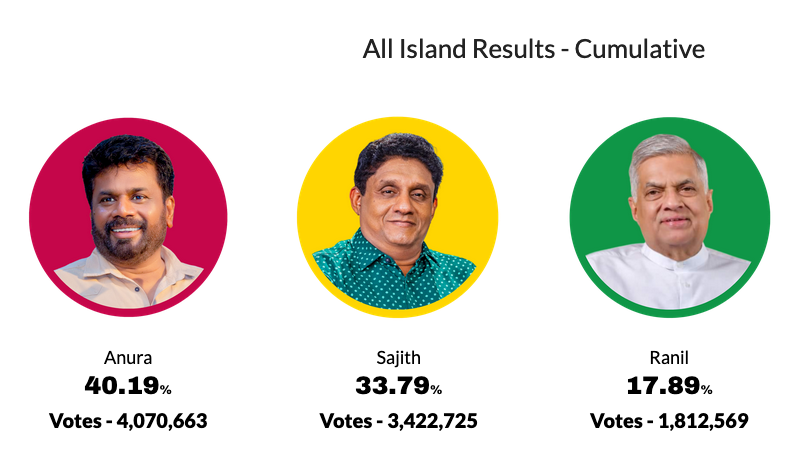Sri Lanka’s Presidential Election Enters Historic Run-off Amid Economic Uncertainty
The results of the second-preference vote count will be pivotal for Sri Lanka’s future direction

For the first time in Sri Lanka’s history, a presidential election has gone into a second round of vote counting. Anura Kumara Dissanayake, the leader of the National People's Power (NPP), and Sajith Premadasa, head of the Samagi Jana Balawegaya (SJB), are locked in a close race after neither secured the required 50% majority to claim victory outright. This development marks a pivotal moment in the country’s electoral and economic landscape, where political choices are driven by the ongoing economic crisis and public frustration with traditional leadership.
Anura Kumara Dissanayake’s political ascent is tied to the JVP (Janatha Vimukthi Peramuna), a party with a tumultuous past. Historically, the JVP led two failed insurrections in 1971 and 1988, both of which were met with violent state crackdowns, resulting in thousands of deaths. However, under Dissanayake's leadership since 2014, the JVP abandoned its violent history, transforming into a democratic force. He formed the NPP coalition to broaden its appeal, a move that has been crucial in distancing the party from its insurgent roots. Now, Dissanayake’s anti-corruption message resonates with voters disillusioned by the economic hardships wrought by Sri Lanka’s debt crisis.
His presidency would introduce significant economic challenges. Dissanayake has vowed to renegotiate Sri Lanka’s $2.9 billion IMF deal, which has imposed harsh austerity measures, including tax hikes and cuts to subsidies. The economic collapse of 2022 left Sri Lanka in shambles, and though the IMF deal brought some stability, Dissanayake’s platform is focused on easing the burden on ordinary citizens by slashing taxes and redirecting aid toward rural communities. His Marxist background signals a desire for state intervention in critical sectors, but economic experts caution that Sri Lanka’s fragile finances may not withstand drastic reforms. Ashwin Hemmathagama, a senior analyst, warns that deviating too far from the IMF programme could plunge the nation into another fiscal collapse.
The stakes are high for Dissanayake. While his promises of economic reform are appealing, Sri Lanka’s foreign reserves stand at perilously low levels, enough to cover only three months of imports. The next president will face the herculean task of balancing economic survival with public expectations for change. Should Dissanayake win, he would be expected to walk a tightrope, attempting to renegotiate debt terms while ensuring the country does not fall deeper into crisis. His victory, should it materialize, would signal a shift in Sri Lanka’s political culture, one that looks beyond the traditional elite for solutions to its enduring challenges.
Meanwhile, Premadasa, representing a more centrist alternative, also supports revisiting the IMF deal but favors a more moderate approach to fiscal reforms. His support from farming communities and the northern Tamil regions indicates a deep regional divide in voter sentiment, with both candidates offering contrasting visions for the country’s future.
Incumbent President Ranil Wickremesinghe’s elimination from the race underscores public frustration with austerity measures. Although his policies helped stabilize the economy after the 2022 meltdown, the political cost of those decisions has been severe. His distant third-place finish highlights the desire for new leadership as Sri Lanka struggles to recover from its most profound economic crisis in decades.
The results of the second-preference vote count will be pivotal for Sri Lanka’s future direction, signaling not just a change in leadership but a potential shift in how the country navigates its complex relationship with global financial institutions and internal development challenges.





